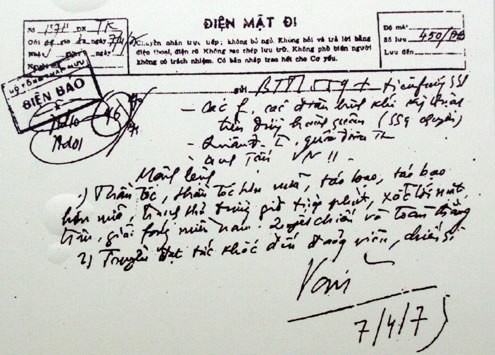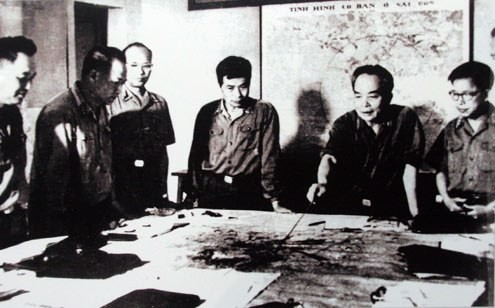(VOVworld)- Numerous activities are underway to mark the 40th anniversary of Vietnam’s southern liberation and national reunification (April 30th, 1975- April 30th, 2015). This victory opened a new era in Vietnam’s history. Starting today, VOV will be bringing you a series of features to mark the event.
In April, 1975, Commander in Chief of the Vietnam People’s Army General Vo Nguyen Giap sent an urgent telegram to the southern front urging forces to speed up the fight and fight more resolutely to win. The secret telegram was of great historic importance to the Ho Chi Minh campaign which aimed to liberate the south and reunify the country.
 |
On April 7, 1975 General Vo Nguyen Giap, from his Command Headquarter in Hanoi, sent a secret telegram that said: “Faster, and faster, aggressive, more aggressive, take advantage of every minute to head to the southern front to liberate the south. We are all determined to fight and to win. This message must be sent to all Party members and soldiers”. The telegram was quickly coded and sent to the commands of all units participating in the southern liberation campaign. Nguyen Ba Liu, a press officer of Brigade 25 was assigned to send the secret telegram. Liu recalls that on April 7, 1975, he was asked to ensure the promptness and accuracy of all messages in and out. Using Morse code, Liu managed to send the telegram within 15 minutes. Liu only realized the importance of the telegram after the day of liberation, April 30. Liu said: “At that time, we did our best to carry out our assigned tasks of ensuring reliable communications. The opportunity to liberate the south had come. All telegrams were important. Later, realizing the historic importance of General Vo Nguyen Giap’s telegram, I was very proud to be the one who sent it out”.

The Central Military Party Committee observed the Ho Chi Minh campaign in 1975.
|
Lieutenant General Khuat Duy Tien was Head of the Combat Department of Army Corps No 3, which was in charge of one attack direction. Tien said the telegram was an order directing him and his soldiers to urgently seize the opportunity to attack. Obeying the order, Army Corps No 3 immediately escalated their fight to liberate Ho Chi Minh city. Tien recalls: “The telegram said the Vietnamese people’s struggle against the American aggressors had reached the right moment and we must act faster and faster to liberate the south. It was time to liberate the south and we must mobilize all resources quickly and move quickly”.
Colonel Nguyen Van Huu, medical officer of the Tay Nguyen Battalion, says the message to attack was clear and resolutely urged soldiers to go quickly to the front. Mr. Huu clearly remembers the moment he received the order: “I was very excited because we had just won on the Buon Me Thuot battlefield and then had to move quickly to the southern front. We were all determined to fulfill our tasks. We moved directly from Buon Me Thuot to the south. Along the way, we liberated the airport at Phan Rang”.
The “Faster” telegram played an important role in the plan of seizing the opportunity to win. Associate Professor Tran Ngoc Long, former Deputy Director of the Vietnam Military History Institute, says the victory of the Tay Nguyen (Central Highlands) campaign revealed an opportunity. The Politburo, the Party Central Committee and the Standing Committee of the Central Military Party Commission decided to turn the strategic attack into a Strategic Offensive. The initial goal was to liberate the south within two years from 1975 to 1976, but it was later shortened to one year. The victory of the Tri Thien Hue and Da Nang campaigns, and the collapse of the strategy of the Army of the Republic of Vietnam created a great opportunity for southern liberation. Seizing this opportunity, on March 31st the Politburo decided to launch am all-out attack to liberate the south. A telegram was sent urging soldiers to seize the opportunity by setting up attack directions and positions to block and attack the final stronghold of the Vietnam Republic. Associate Professor Tran Ngoc Long elaborates: “If we had missed this opportunity, the enemy would have had time to recover and readjust their strategy and the war would have been prolonged. The war in Vietnam was extremely internationalized with major countries dominating the war. So, if we had not taken this opportunity, it would have been difficult for us to liberate the south by April”.
General Vo Nguyen Giap’s order demonstrated the correctness and strategic vision of the Politburo of the Party Central Committee and the Central Military Party Commission paving the way for the complete victory of the 1975 Spring Campaign, thus liberating the south and reunifying Vietnam.